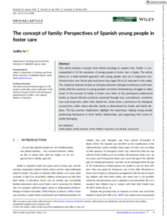This article employs concepts from family sociology to explore how ‘family’ is conceptualised in 14 life narratives of young people in foster care in Spain.
The article draws on a multi-method approach with young people who are in long-term non-kinship foster care. Seven girls and seven boys aged 10 to 22 took part in the study.
The empirical material reveals an interplay between biological preference and foster family affective practices in young people's narratives, illuminating a struggle to make sense of the concept of family in foster care. Most of the participants understand family as shared affective practices sustained through love, commitment, consistent care and reciprocity rather than blood ties. Some show a preference for biological connectivity, while others describe family as determined by rituals and family displays.
The key practice implications highlight the importance helping young people positioning themselves in birth family relationships, and supporting their sense of family belonging

